|
 |
|
 |
|
|
 |
|  |
|
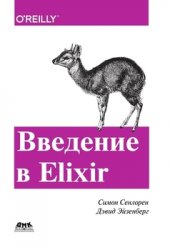 Название: Введение в Elixir. Введение в функциональное программирование Название: Введение в Elixir. Введение в функциональное программирование
Автор: Сенлорен С., Эйзенберг Д.
Издательство: ДМК Пресс
ISBN: 978-5-97060-518-9
Год: 2017
Страниц: 262
Язык: русский
Формат: pdf, djvu
Размер: 39.9 MB
Отличное введение в Elixir для людей с практическим складом ума. Авторы сразу переходят к сути и дают прекрасный обзор возможностей языка Elixir, достаточно глубокий, чтобы познакомить читателя с языком и вызвать желание попробовать его.
Красивый, мощный и компактный, язык программирования Elixir отлично подходит для изучения функционального программирования, и это практическое введение покажет вам, насколько широкими возможностями он обладает. Авторы расскажут, как Elixir сочетает в себе надежность языка функционального программирования Erlang с подходом, который больше похож Ruby, а также мощную поддержку макросов для метапрограммирования. | |
Разместил: rivasss 10-06-2025, 08:18 | Комментарии: 1 | Подробнее
| | | |
 |
|  |
 |
|
 |
|
|
 |
|  |
|
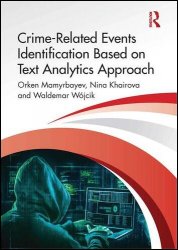 Название: Crime-Related Events Identification Based on Text Analytics Approach Название: Crime-Related Events Identification Based on Text Analytics Approach
Автор: Orken Mamyrbayev, Nina Khairova, Waldemar Wójcik
Издательство: Routledge
Год: 2025
Страниц: 141
Язык: английский
Формат: pdf (true), epub (true)
Размер: 16.8 MB
As modern society is extremely dependent on the Internet, social networks, and developing technologies, a threat to the security of both the individual and society as a whole has emerged. The openness and global nature of the Internet create opportunities both for criminals, who can use the available information for criminal purposes, and for law enforcement officials. Police officers, in turn, can deal with the preventive processing of data from the Internet in order to prevent crimes. This type of data analysis can detect illegal or criminal actions even at the stage of their formation. Crime-Related Events Identification Based on Text Analytics Approach describes the possibilities of extracting crime-related facts from semi-structured information from various Internet sources so that crime can be combatted. This book is aimed at police officers and IT professionals working in online investigations. Integrating Machine Learning methods such as text classification, clustering, and Latent Semantic Analysis, this book highlights the potential of Artificial Intelligence (AI)‑driven approaches to improve public safety and address the limitations of traditional natural language processing (NLP) methods. | |
Разместил: Ingvar16 10-06-2025, 07:19 | Комментарии: 0 | Подробнее
| | | |
 |
|  |
 |
|
 |
|
|
 |
|  |
|
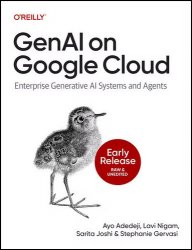 Название: GenAI on Google Cloud: Enterprise Generative AI Systems and Agents (Early Release) Название: GenAI on Google Cloud: Enterprise Generative AI Systems and Agents (Early Release)
Автор: Ayo Adedeji, Lavi Nigam, Sarita Joshi, Stephanie Gervasi
Издательство: O’Reilly Media, Inc.
Год: 2025-06-10
Язык: английский
Формат: pdf, epub
Размер: 10.1 MB
In today's AI landscape, success depends not just on using large language models but on moving them into production in a way that's scalable, compliant, and cost-effective. GenAI on Google Cloud: Enterprise Generative AI Systems and Agents is your hands-on guide to bridging that gap. Whether you're an ML engineer tackling your first multi-agent application or a product leader responsible for scaling a GenAI strategy, this book offers a practical game plan for taking your LLM applications from promising prototype to enterprise-grade solution. Written by practitioners with deep experience in MLOps, data engineering, and GenAI infrastructure, this guide takes you through real-world workflows using Google Cloud's Vertex AI—from training and deployment to monitoring and integration. With concrete examples, field-tested frameworks, and honest insights about what actually works, you'll learn how to build production systems that deliver measurable business value. | |
Разместил: Ingvar16 10-06-2025, 06:08 | Комментарии: 0 | Подробнее
| | | |
 |
|  |
 |
|
 |
|
|
 |
|  |
|
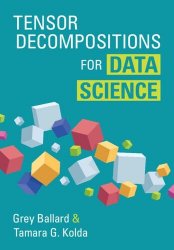 Название: Tensor Decompositions for Data Science Название: Tensor Decompositions for Data Science
Автор: Grey Ballard, Tamara G. Kolda
Издательство: Cambridge University Press
Год: 2025
Страниц: 423
Язык: английский
Формат: pdf (true)
Размер: 34.5 MB
Tensors are essential in modern day computational and Data Science. This book explores the foundations of tensor decompositions, a data analysis methodology that is ubiquitous in Machine Learning, signal processing, chemometrics, neuroscience, Quantum Computing, financial analysis, social science, business market analysis, image processing, and much more. In this self-contained mathematical, algorithmic, and computational treatment of tensor decomposition, the book emphasizes examples using real-world downloadable open-source datasets to ground the abstract concepts. Methodologies for 3-way tensors (the simplest notation) are presented before generalizing to d-way tensors (the most general but complex notation), making the book accessible to advanced undergraduate and graduate students in mathematics, Computer Science, statistics, engineering, and physical and life sciences. Additionally, extensive background materials in linear algebra, optimization, probability, and statistics are included as appendices. We do not prescribe a specific computational platform, but everything described here can be computed using the Tensor Toolbox for MATLAB. Much of the same functionality is available in its Python clone, the Python Tensor Toolbox (PyTTB). | |
Разместил: Ingvar16 9-06-2025, 20:21 | Комментарии: 0 | Подробнее
| | | |
 |
|  |
 |
|
 |
|
|
 |
|  |
|
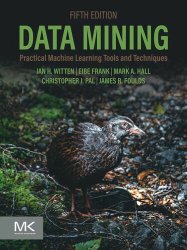 Название: Data Mining: Practical Machine Learning Tools and Techniques, 5th Edition Название: Data Mining: Practical Machine Learning Tools and Techniques, 5th Edition
Автор: Ian H. Witten, Eibe Frank, Mark A. Hall, Christopher J. Pal, James R. Foulds
Издательство: Morgan Kaufmann/Elsevier
Год: 2026
Страниц: 688
Язык: английский
Формат: epub (true)
Размер: 27.5 MB
Data Mining: Practical Machine Learning Tools and Techniques, Fifth Edition, offers a thorough grounding in Machine Learning concepts, along with practical advice on applying these tools and techniques in real-world data mining situations. This highly anticipated new edition of the most acclaimed work on data mining and Machine Learning teaches readers everything they need to know to get going, from preparing inputs, interpreting outputs, evaluating results, to the algorithmic methods at the heart of successful data mining approaches. Machine Learning provides the technical basis of data mining. It is used to extract information from the raw data in databases—information ideally expressed in a comprehensible form and that can be used for a variety of purposes. The process is one of abstraction, taking the data, warts and all, and inferring whatever structure underlies it. This book is about the tools and techniques of Machine Learning that are used in practical data mining for finding and, if possible describing, structural patterns in data. | |
Разместил: Ingvar16 9-06-2025, 19:24 | Комментарии: 0 | Подробнее
| | | |
 |
|  |
 |
|
 |
|
|
 |
|  |
|
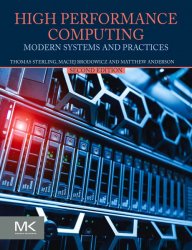 Название: High Performance Computing: Modern Systems and Practices, 2nd Edition Название: High Performance Computing: Modern Systems and Practices, 2nd Edition
Автор: Thomas Sterling, Matthew Anderson, Maciej Brodowicz
Издательство: Morgan Kaufmann/Elsevier
Год: 2025
Страниц: 480
Язык: английский
Формат: epub (true)
Размер: 93.3 MB
Performance Computing: Modern Systems and Practices is a fully comprehensive and easily accessible treatment of high performance computing, covering fundamental concepts and essential knowledge while also providing key skills training. With this book, students will begin their careers with an understanding of possible directions for future research and development in HPC, domain scientists will learn how to use supercomputers as a key tool in their quest for new knowledge, and practicing engineers will discover how supercomputers can employ HPC systems and methods to the design and simulation of innovative products. This new edition has been fully updated, and has been reorganized and restructured to improve accessibility for undergraduate students while also adding trending content such as Machine Learning and a new chapter on CUDA. Matplotlib is a freely available and open-source Python language-based visualization tool that has an interface with the look and feel of Matlab. Python is frequently used in scientific visualization, and in the case of Matplotlib, using Python is a requirement. | |
Разместил: Ingvar16 9-06-2025, 18:45 | Комментарии: 0 | Подробнее
| | | |
 |
|  |
 |
|
 |
|
|
 |
|  |
|
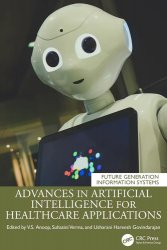 Название: Advances in Artificial Intelligence for Healthcare Applications Название: Advances in Artificial Intelligence for Healthcare Applications
Автор: V.S. Anoop, Suhasini Verma, Usharani Hareesh Govindarajan
Издательство: CRC Press
Год: 2025
Страниц: 306
Язык: английский
Формат: pdf (true), epub
Размер: 36.5 MB
Advances in Artificial Intelligence for Healthcare Applications comprehensively covers the theoretical foundations, applications, and research potential of Artificial Intelligence (AI) in the healthcare domain. AI is a simulation of computerised algorithms to disjoin complicated data. The application of AI in the medical profession rises in tandem with the complexity of data in the healthcare industry. The most favourable use of AI in clinical diagnosis is diagnostic imaging. Several classifiers have been employed in this study to classify images captured at the microscopic level. The suggested architecture takes advantage of four cutting-edge Convolutional Neural Networks (CNNs) (i.e., GoogLeNet, Darknet53, Inception-ResNet-v2, and Xception) to combine the features they acquired in respective feature extraction layers. Binary tree, SVM, K-NN, NAIVE BAYES, and Neural Network are the five ML techniques that are used to provide classification outputs from the combined features. The text is primarily written for senior undergraduates, graduate students, and academic researchers in the fields of electrical engineering, electronics and communications engineering, Computer Science and engineering, and biomedical engineering. | |
Разместил: Ingvar16 9-06-2025, 18:06 | Комментарии: 0 | Подробнее
| | | |
 |
|  |
 |
|
 |
|
|
 |
|  |
|
 Название: VBA mit Excel - Das umfassende Handbuch (6 , aktualisierte Auflage, 2025) Название: VBA mit Excel - Das umfassende Handbuch (6 , aktualisierte Auflage, 2025)
Автор: Bernd Held
Издательство: Rheinwerk Verlag GmbH
Год: 2025
Страниц: 1037
Язык: немецкий
Формат: epub (true)
Размер: 17.3 MB
Werden Sie unter Anleitung des Erfolgsautors Bernd Held zum Profi in Excel-VBA! Von den Grundlagen und der Objektprogrammierung über Funktionen und Ereignisse bis hin zu UserForms oder Symbolleisten: Hier ist alles drin, mit zahlreichen Beispielen illustriert. Dank der Best Practices erstellen Sie leicht Ihren eigenen Code und haben im Fehlerfall immer die passende Lösung parat. Sie erfahren zudem, wie Sie von KI-Tools bei der VBA-Programmierung profitieren. Das Buch ist Einführung, Arbeitsbuch und Nachschlagewerk in einem und unverzichtbar für die Arbeit mit Excel-VBA. Mit über 650 sofort einsetzbaren Makros zum Download. Geeignet für Excel 2016 bis 2024 und das Office-Abo Microsoft 365. | |
Разместил: Ingvar16 9-06-2025, 16:36 | Комментарии: 0 | Подробнее
| | | |
 |
|  |
 |
|
 |
|
|
 |
|  |
|
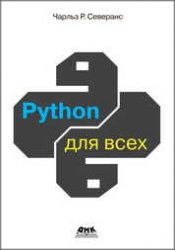 Название: Python для всех Название: Python для всех
Автор: Северанс Ч. Р.
Издательство: ДМК Пресс
Год: 2021 (2022)
Cтраниц: 262
Формат: pdf
Размер: 14 мб
Язык: русский
Python — простой в изучении и практическом использовании язык программирования, который свободно доступен на компьютерах под управлением Mac OS, Windows и Linux. Изучив Python, вы сможете использовать его в своей профессиональной деятельности, не покупая какое-либо программное обеспечение. Данная книга представляет собой курс программирования на языке Python. Краткий и четкий стиль изложения и многочисленные упражнения позволят достаточно быстро овладеть основными навыками программирования и методами обработки данных. Издание предназначено широкому кругу читателей, которые не являются программистами и хотели бы освоить язык Python с нуля. | |
Разместил: rivasss 9-06-2025, 16:21 | Комментарии: 0 | Подробнее
| | | |
 |
|  |
 |
|
 |
|
|
 |
|  |
|
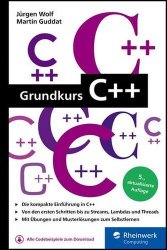 Название: Grundkurs C++ (5, aktualisierte und erweiterte Auflage, 2025) Название: Grundkurs C++ (5, aktualisierte und erweiterte Auflage, 2025)
Автор: Jürgen Wolf, Martin Guddat
Издательство: Rheinwerk Verlag GmbH
Год: 2025
Страниц: 496
Язык: немецкий
Формат: pdf, epub (true)
Размер: 10.1 MB
Dieser Grundkurs ist genau das Richtige für alle, die einen schnellen Einstieg in die Programmiersprache C++ und einen Überblick über die Grundlagen ohne viel Beiwerk suchen. Ausführlich und jederzeit verständlich erklären Martin Guddat und Jürgen Wolf alles, was notwendig ist, damit Sie modernes C++ lernen und objektorientiert programmieren können. Von der ersten Seite an geht es sofort los mit einfachen Programmen bis hin zur Entwicklung komplexerer Anwendungen. Übungen am Ende jedes Kapitels helfen Einsteiger*innen und vor allem Selbstlerner*innen beim Verstehen der Sprache. Die kompakte Darstellung macht das Buch zu einer unverzichtbaren Referenz für die Arbeit mit C++.Diese fünfte Auflage wurde umfassend überarbeitet und modernisiert.Das Buch eignet sich hervorragend als Begleiter für das Studium der Informatik und anderer technischer Fächer. | |
Разместил: Ingvar16 9-06-2025, 06:33 | Комментарии: 0 | Подробнее
| | | |
 |
|  |
|